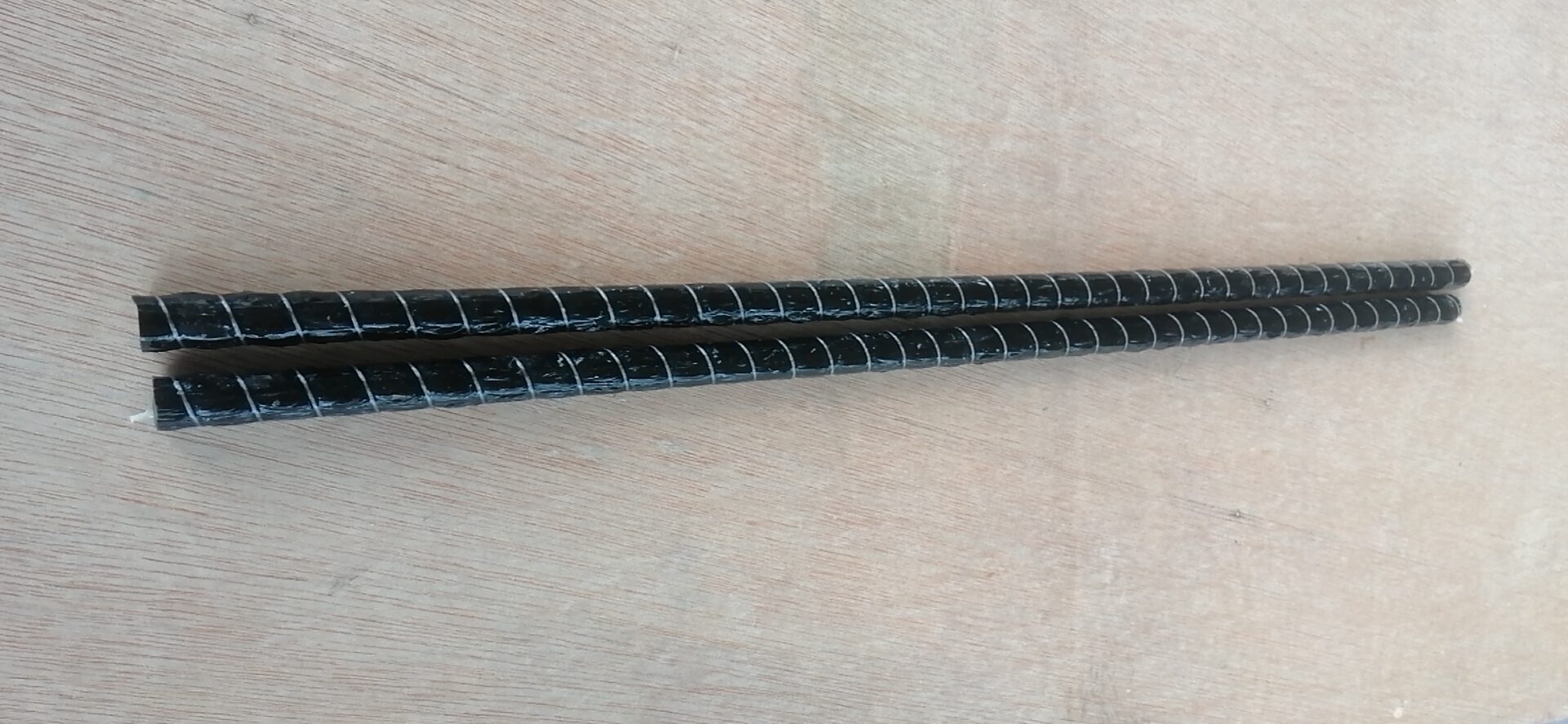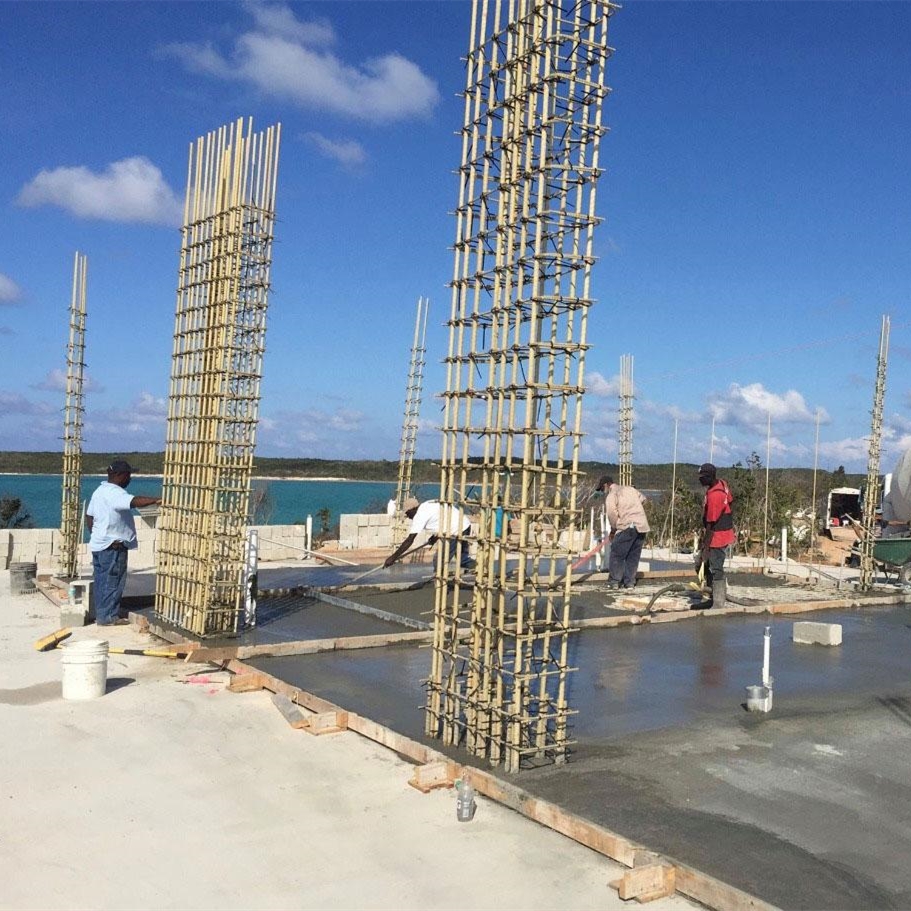Basalt fiber rebar and fiberglass rebar are both varieties of composite reinforcement. Their manufacturing process is the same; the only difference is raw material: the first one is made of basalt fiber, the second one – glass fiber .

What is Basalt Fiber Rebar?
Basalt fiber rebar is a rod with continuous spiral ribbing, formed by winding basalt yarn moistened with a high-strength polymer compound. Basalt fiber is a product of a single step extraction from molten basaltic rock without the use of any chemicals. Basalt is igneous rock formed from the rapid cooling of basaltic lava exposed at or very near the surface of the earth’s crust.
Basalt fiber rebar is designed to replace steel rebar in concrete reinforcement, especially in applications where corrosion is a major concern. Basalt fiber rebar has a number of advantages over steel rebar, such as:
·It is 2.5 times stronger than steel in tensile strength.
·It is 5 times lighter than steel.
·It is naturally resistant to alkali, rust, and acids.
·It has the same thermal coefficient expansion as concrete, which means it does not cause cracking due to temperature changes.
·It does not need any special coating like glass fiber rebar.
·It does not conduct electricity or induce fields when exposed to radio frequency, which makes it suitable for hospital or data center buildings.
·It can withstand higher temperatures before weakening.
Some of the applications of basalt fiber rebar include:
·Roads, bridges, buildings, and other infrastructure projects
·Precast concrete products
·Seawalls, barriers, and coastal structures
·Balconies, pool decks, patios, and other flatwork
·Tunnel lining and repair

What is Fiberglass Rebar?
Fiberglass rebar is a rod made from fiberglass roving and resin. Fiberglass is a type of glass fiber reinforced polymer (GFRP) that consists of fine fibers of glass embedded in a plastic matrix. Fiberglass rebar is also known as FRP or composite rebar.
Fiberglass rebar is another alternative to steel rebar in concrete reinforcement, especially in applications where weight reduction or corrosion resistance is important. Fiberglass rebar has some benefits over steel rebar, such as:
·It is up to 7 times lighter than steel in concrete flatwork applications, which reduces the load on the structure and the transportation cost.
·It is up to 4 times lighter than steel in general applications.
·It does not corrode or rust even with minimal concrete coverage, which extends the service life of the structure.
·It has 2 times the tensile strength of steel.
·It does not require heat treatment or welding like steel, which simplifies the installation process.
·It is non-conductive and non-magnetic, which eliminates the risk of electric shock or interference with sensitive equipment.
Some of the applications of fiberglass rebar include:
·Residential and commercial flatwork such as parking lots, sidewalks, driveways, and pool decks
·Bridge decks and barriers
·Seawalls and marine structures
·Balconies and railings
·Foundation walls and slabs
Basalt Fiber Rebar vs Fiberglass Rebar: Comparison
Basalt fiber rebar and fiberglass rebar have many similarities in terms of their properties and applications. They both offer superior performance over steel rebar in terms of strength, weight, durability, and resistance to environmental factors. However, they also have some differences that may affect their suitability for different projects. Here are some of the main points of comparison between basalt fiber rebar and fiberglass rebar:
·Cost: Basalt fiber rebar is generally more expensive than fiberglass rebar due to its higher production cost and limited availability. However, the cost difference may be offset by the savings in transportation, installation, and maintenance, as well as the longer service life and lower environmental impact of basalt fiber rebar.
·Color: Basalt fiber rebar is usually black or dark gray, while fiberglass rebar can be various colors depending on the resin used.The color of the rebar may affect the aesthetic appearance of the concrete structure, as well as the visibility and identification of the rebar during installation and inspection.
·Modulus of elasticity: Basalt fiber rebar has a mean tensile modulus of elasticity of 46.88 GPa, which is close to that of steel. This means that basalt fiber rebar has a similar stiffness and deformation behavior as steel. Fiberglass rebar has a lower modulus of elasticity, ranging from 20 to 50 GPa depending on the product. This means that fiberglass rebar has more flexibility and elongation than steel or basalt fiber rebar. The modulus of elasticity affects the crack width and deflection of the concrete structure, as well as the compatibility and compatibility between different materials. Basalt fiber rebar has a better match with concrete in terms of modulus of elasticity, which reduces the stress concentration and cracking potential. Fiberglass rebar may require more reinforcement or design adjustments to achieve the same level of performance as steel or basalt fiber rebar.
·Fire resistance: Basalt fiber rebar has a higher fire resistance than fiberglass rebar due to its higher melting point (1450°C) and lower thermal conductivity (0.031 W/mK). This means that basalt fiber rebar can withstand higher temperatures before weakening or melting, which increases the fire safety and durability of the concrete structure. Fiberglass rebar has a lower melting point (700-900°C) and higher thermal conductivity (0.4-1.5 W/mK), which makes it more susceptible to fire damage or loss of strength.
Conclusion
Basalt fiber rebar and fiberglass rebar are both viable alternatives to steel rebar in concrete reinforcement, offering many advantages in terms of strength, weight, durability, and resistance to environmental factors. However, they also have some differences in terms of cost, color, surface, modulus of elasticity, and fire resistance that may affect their suitability for different projects. Therefore, it is important to consider the specific requirements and conditions of each project before choosing the best type of rebar for concrete reinforcement.


